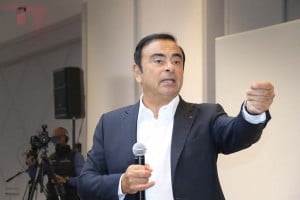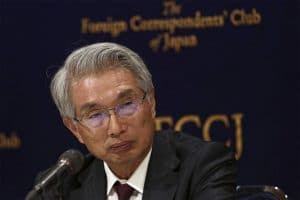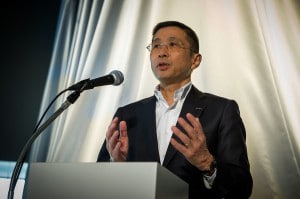
Carlos Ghosn’s been released after posting $4.5 million bail. He won’t get that back after fleeing Japan recently for Lebanon.
Carlos Ghosn, the former head of the Renault-Nissan-Mitsubishi Alliance, has jumped bail and fled from Japan to his family’s homeland of Lebanon, adding another unexpected twist to a tale of alleged corruption that began with his surprise arrest after landing at Tokyo’s Haneda Airport in November 2018.
Authorities ordered Ghosn held for months in a tiny cell in the Tokyo Detention Center, piling on a series of accusations that started with claims he had hidden millions of dollars in income, later adding allegations that he had diverted millions more through a network of friends and associates.
For his part, Ghosn has repeatedly professed his innocence, accusing officials at Nissan, as well as Japanese prosecutors of staging a “coup.” And, in a statement issued late Monday after fleeing Japan, he declared, “I am now in Lebanon and will no longer be held hostage by a rigged Japanese justice system where guilt is presumed.”
(Nissan to get hit with $22M fine for underreporting Ghosn’s compensation)
After spending much of the first third of 2018 incarcerated, Ghosn was granted bail but kept on a short leash, required to stay close to Tokyo, wear a monitoring device and, according to authorities, avoid contact with his wife, Carole, in order to prevent any efforts to tamper with evidence. Authorities had tried to keep the once high-flying executive in detention arguing, among other things, that he might try to flee the country.

Ghosn attorney Junichiro Hironaka, has been pushing to turn the case upside-down, focusing on an alleged conspiracy by government officials and Nissan.
How Ghosn escaped Japan is yet unclear. Among other things, he was required to surrender his passports after his arrest. And he was being closely watched. His legal team in Japan said that they continue to hold his three passports – he has citizenship in both France and Lebanon and was born in Brazil.
Ghosn’s attorney, Junichiro Hironaka, told Japanese media he was surprised by his client’s sudden departure, insisting he hadn’t seen Ghosn since Dec. 25, when they met to discuss pretrial proceedings. Hironaka said he only learned of the latest developments from the news.
Authorities reportedly said they have no records indicating Ghosn left the country under his own name. Whether he might have fled Japan using an alias and false passport is something that likely will be examined. His face is widely known in Japan where, in earlier years he was viewed as a hero for helping engineer a $6 billion bailout of the then-failing Nissan by French alliance partner Renault.
The Wall Street Journal quoted “a person familiar with the matter” indicating that Ghosn arrived in Turkey before continuing on to Lebanon, where his parents originally came from.
Lebanese law bans extradition of its citizens, so it is unlikely Ghosn will fall within reach of Japanese authorities as long as he remains there. But whether the once globe-trotting executive would be willing to stay in his ancestral home permanently is uncertain.

Carlos Ghosn was not permitted to speak with his wife, Carole, unless he received permission from the court.
(One year after arrest, Carlos Ghosn fires back)
He is likely to receive a hero’s welcome there, however. There long had been talk about the possibility Ghosn might return to Lebanon to run for political office. His likeness even appeared on a postage stamp there in 2017.
How the bail jumping will impact the corruption case is unclear. At the very least, Ghosn will forfeit the ¥1.5 billion, or $13.8 million, he paid in bail.
Authorities could still pursue a trial in absentia, existing charges against the one-time auto executive posing the possibility of up to 15 years in jail. Ghosn, were he to return to Japan, could face additional charges for fleeing the country.
“I have not fled justice – I have escaped injustice and political persecution,” Ghosn said in his statement, adding that he could “finally communicate freely with the media, and look forward to starting next week”.

Former Nissan CEO Hiroto Saikawa plans to repay the automaker for about $440,000 in excess payments.
He has frequently railed against prosecutors – as well as executives at Nissan – whom he alleged were using trumped-up charges as part of a broader plan to limit Renault’s control over the Japanese automaker.
But several planned Ghosn news conferences were cancelled, those familiar with the case saying the former Nissan chief was worried he would be arrested again.
Ghosn wasn’t the only one ensnared by an internal investigation into financial irregularities at Nissan. His former lieutenant, Greg Kelly, was also arrested on Nov. 19, 2018, after arriving in Tokyo with Ghosn. He has been accused of conspiring to conceal Ghosn’s unreported pay.
(Nissan CEO admits to getting overpaid, benefitted from program that Led to Ghosn’s ouster)
In an ironic twist, the internal probe later revealed that Nissan CEO Hiroto Saikawa also had concealed some of his pay. Saikawa was among Ghosn’s harshest critics after his arrest. He was forced to retire in November.

Best news of the Holiday season.
For the conspiracy minded (Sergio and Jeffery each have their own island in the Caribbean) — the Japanese prosecutor allowed/helped Carlos ‘escape’ since they accomplished their goal of removing him from running Nissan and didn’t have any evidence to get a conviction on the trumped-up charges.
Interesting position which, it turns out, is the close of the update we are just posting.
Paul E.